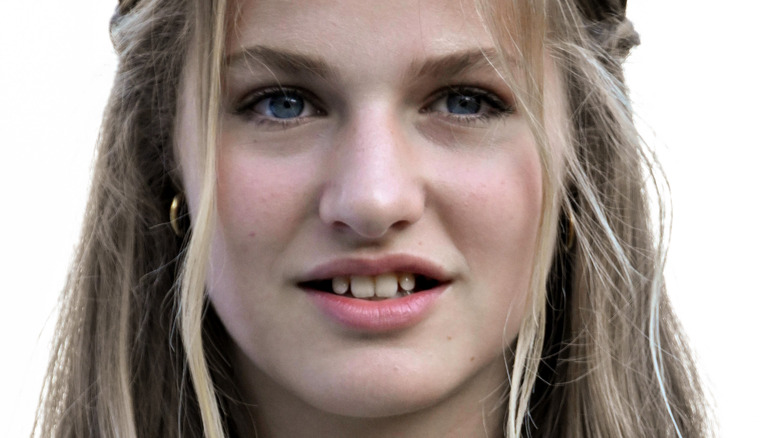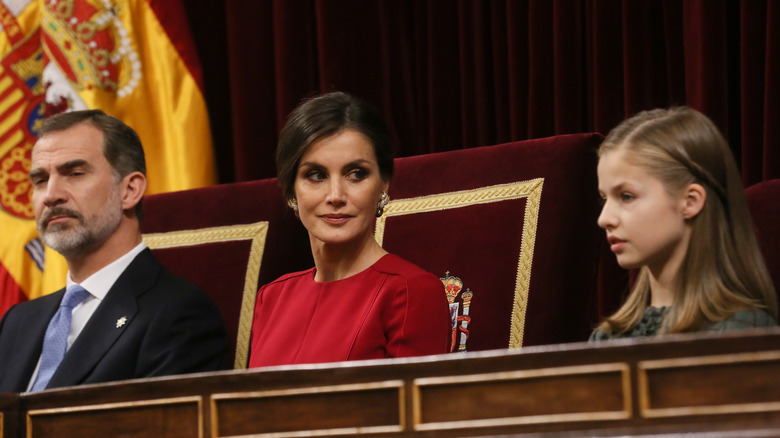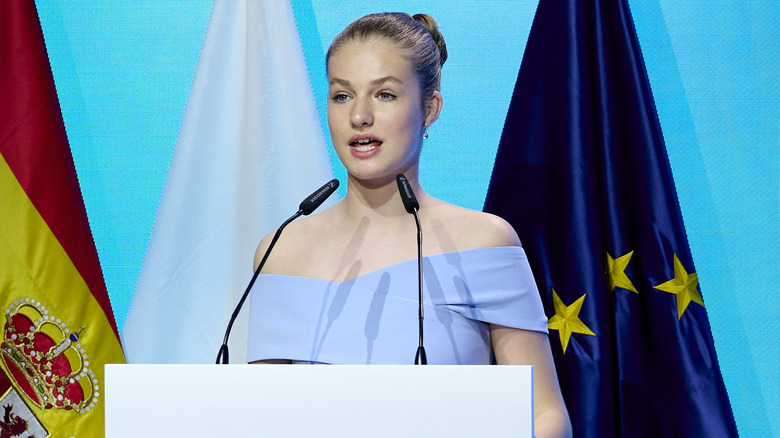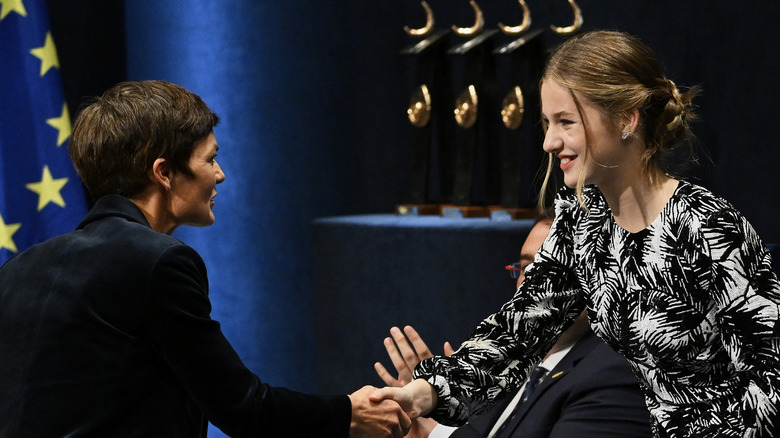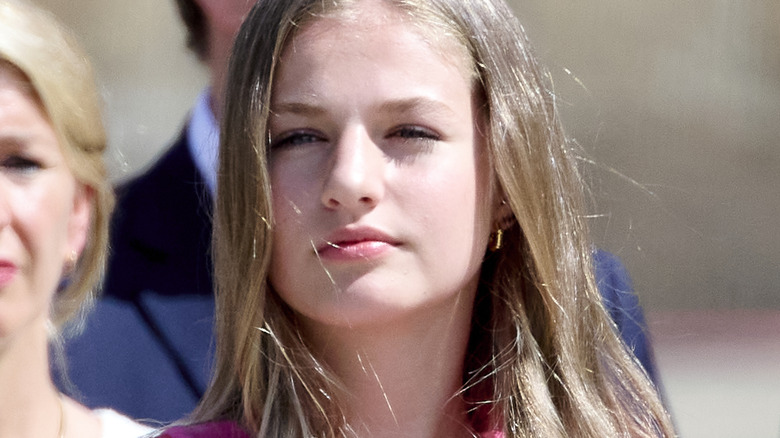How Princess Leonor's Life Will Change When She Becomes Queen
Princess Leonor of Asturias, Spain, is a high schooler who is set to become a queen. As the elder daughter of Their Majesties, King Felipe VI and Queen Letizia, the 17-year-old has spent most of her life preparing to become the heir to the Spanish Throne, according to the Spanish Royal Family's website, Casareal.
But her path to becoming the next head of state is not without a Shakespearean-style royal scandal. After Princess Leonor's grandfather was forced to abdicate from the throne due to financial corruption allegations and a controversial elephant hunting trip to Botswana with his mistress, he handed his position to his son, Felipe, in 2014 (via The Washington Post). Since then, Princess Leonor has been making more public appearances, giving the Spanish public a glimpse into her leadership style.
However, like England, Spain has male-preference primogeniture, which means a first-born male is favored over a first-born female royal descendant as the King's successor. So, in the unlikely event that Princess Leonor's parents give birth to a son, she will no longer be considered first in line for the throne, according to Pure Wow. However, it is more than likely that Princess Leonor will be the first queen head of the state of Spain since Queen Isabella II, who reigned from 1833 to 1868 (via Britannica). As queen, the high schooler's life will change drastically; here's how.
At her coronation, Princess Leonor will receive a new title
Princess Leonor became the Heir to the throne when her father, Felipe, became King on June 19, 2014 (via History.com). According to the Spanish Royal Family's website, Casareal, Princess Leonor currently holds four titles, which she will no longer use once she is queen. She is commonly known as Her Royal Highness the Princess of Asturias, Leonor de Borbón y Ortiz. As she is the firstborn of the Kingdom of Castile, the Throne of Aragon, and the Kingdom of Navarre, she also has the title of Princess of Girona and Princess of Vian. Her other two titles are Duchess of Montblanc and "Countess of Cervera and Lady of Balaguer."
Although it is unknown when King Felipe will abdicate from the Throne, Princess Leonor will lose her current titles when he does. So what will her formal title be upon her coronation? If tradition and her father's title are anything to go by, the young Princess will most likely take on the new title of "Her Majesty, Queen Leonor de Borbón y Ortiz when she officially becomes Spain's Head of State.
Even though her younger sister, Sofia, is also considered royal, as she is the second born and will not take the throne, she is not referred to as a princess. Still, she holds the title of Her Royal Highness Sofía de Borbón y Ortiz, Infanta of Spain.
As queen Princess Leonor will become Spain's head of state
For most teenagers, the idea of becoming a head of state would be daunting, but Princess Leonor has been preparing to be her country's monarch for most of her life. As queen, Princess Leonor will be a hereditary and constitutional monarch, which means she is rightfully born into the role of Head of State after her father abdicates from the crown. Her duties will be to invoke laws, dissolve the legislature, and sign treaties decided upon by the Spanish government. While she will significantly influence the government and be privy to all the country's affairs, her power is limited and shared by the Spanish government, as outlined in Spain's constitution per Britannica. Being Head of State within a democratic system of government means, for the most part, Leonor will act more as the country's representative and a symbol of Spain's unity (via Thoughtco). However, as her father, King Felipe, demonstrated, being the nation's Head of State plays a vital role during a national crisis. For example, when Spain found itself in a political party deadlock in 2015, the King dissolved the parliament and announced new elections, per The Business Soiree. As Queen, Princess Leonor will also have to make difficult decisions and prove to the public that she will abide by the constitution and advocate for Spain's essential values of freedom, justice, equality, and political pluralism (via Britannica).
She will be Spain's highest representative in international relations
Princess Leonor would be aiming for As in Social Studies classes because once she is queen, she will be regarded as Spain's highest representative in international relations. As Spain's monarch, Leonor will be expected to express Spain's position in international commitments through treaties (via Casareal). Fortunately, the 17-year-old already has a head start, as her fluency in several languages, including Spanish, Catalan, Galician, Basque, English, French, Arabic, and Chinese, is sure to help her take on her international commitments, per Royal Family.
Princess Leonor's parents have enrolled her in the two-year International Baccalaureate at UWC Atlantic College, a private school with an impressive South Wales campus (via El Pais), to prepare her for life as Spain's monarch. The royal household chose this college because of its "open and critical spirit" and because it "has no religious, political or other kinds of leaning."
Princess Leonor's father, King Felipe, is Spain's most highly educated king. Felipe has a law degree from Madrid's Autonomous University and a master's degree in International Affairs from Georgetown University in Washington, D.C., per Britannica. Although it is unknown what Leonor is set to study after high school, it is clear that her father would like her to be ready to represent Spain on the world stage, so she may also study International Affairs to make her better equipped for her role as queen.
She will be able to call for referendums
As queen, Princess Leonor has the power to call for a referendum if the circumstances are allowed in the Spanish Constitution, per La Moncloa. Although it is rare for a Spanish monarch to call for a referendum, she will constantly be asked to express views on important issues impacting Spain. For example, in 2017, her father, King Felipe, called Catalonia's independence referendum and called its leaders "irresponsible." King Felipe said the Spanish crown was firmly committed to the Spanish constitution and democracy, emphasizing that his role as a monarch was about his commitment "to the unity and permanence of Spain," according to ABC News.
Besides being able to call for referendums, Princess Leonor will also be able to declare war and make peace when she becomes the monarch. She will not have any power over the military, but she will be seen as the people's mouthpiece and Spain's symbol of unity, per Britannica. Princess Leonor's authority as queen will give her enormous responsibilities, and she must demonstrate that she can handle her role.
With the current political tension in Spain, including the monarchy's declining popularity (via Reuters), as monarch, Princess Leonor will have to maintain neutrality, a constitutional expectation of any Spanish monarch highly regarded by the Spanish people. The stylish teen is now gaining media attention for her sartorial choices, but upon becoming Spain's monarch, the media and the public will analyze her political decisions closely.
She can influence Spain's laws and government
One of the perks of being Spain's queen is that once she gets the title, Princess Leonor will be able to sanction and declare laws (via Casareal). Another perk is that as Spain's Head of State, Leonor will not be subjected to any judicial process as she will be protected by the country's constitution and can not be held responsible for her actions (according to The Local). However, Spain's Prime Minister Pedro Sánchez is not a fan of this type of legal immunity and questioned the king's current privilege: "I think it's not necessary for the king's inviolability to be recognized. It's the product of another era, a legitimate one at that stage, but not something for a consolidated democracy with more than 40 years of history," Sánchez told a Spanish radio station.
This criticism is closely linked to Leonor's grandfather, Juan Carlos, who abdicated from the throne when he was charged with corruption in 2011. The Spanish royal family has been under damage control since this event, and King Felipe even imposed new rules under Spain's transparency laws to help the monarchy regain trust and public favor (via Reuters). With her family's scandalous history, Leonor, like her father, will also have to prove that she does not believe she is above the law but instead use her authority to promote Spain's constitutional values.
She will not run for office but be subject to more public scrutiny
Although Princess Leonor will not be elected queen or run for office, she will be the subject of more public scrutiny. According to El Pais, the Spanish royal family is interested in the public's opinion of the monarchy. When Leonor is queen, she must convince the Spanish people of the monarchy's relevance. This will not be an easy task, especially since a 2020 poll for the Platform for Independent Media found 40.9% of respondents said they preferred a republic, while 34.9% said they were in favor of having a monarchy, and 24.2% of respondents said they were unsure and did not know (via Reuters).
The good news for Leonor is that in 2021 a survey for the leading Spanish newspaper ABC looked into the popularity of each member of Spain's royal family. While her parents ranked first and second on the survey, Princess Leonor was rated highly as the third most popular royal family member and scored 6.4 out of 10. Survey respondents were also asked about Princess Leonor's first public solo appearance at an event in 2021, and 60% of those polled praised the young royal (via Royal Central). However, as queen, Princess Leonor will be subject to more public opinion polls, and her every move is set to be closely examined.
She will have to strengthen ties with the people of Catalonia
One of Spain's biggest dilemmas is Catalonia's cry for independence from the Spanish government (via Reuters), and with this issue is a large disregard for the monarchy. According to Catalan News, most Catalonians do not support the monarchy, with seven out of 10 Catalonians preferring a republic. Although Leonor's father, King Felipe, has argued that he is upholding the Spanish constitution by blocking the country's break-up, some have labeled him as inflexible in how he has handled Catalan separatists (via Foreign Policy). Once queen, Princess Leonor will have to find a way to navigate this contentious issue and help bridge ties between the people of the Catalonia region and the rest of Spain.
In 2019, Princess Leonor attended the Princess of Girona Foundation Awards in Barcelona, Catalonia, Spain, where she delivered a speech in Catalan, the local language of Catalonia. The young royal impressed the crowd with her fluency and told audience members, "This land, Catalonia, will always occupy a special place in my heart," as reported by Royal Central.
She will be able to appoint the president and other government officials
According to the Spanish Constitution, a Spanish monarch plays an important role in working alongside the country's government and should "be informed of the affairs of State and, for this purpose, preside over the meetings of the Council of Ministers" (Article 62 g), per Casareal. Therefore, Princess Leonor must be well-versed in Spain's laws and thoroughly understand the country's legislative system to be an effective queen.
Once she takes the throne, Princess Leonor can influence Spain's future through the government. She will be able to propose the candidate for President of the Government of Spain and, where appropriate, appoint the president. Her role will also be to uphold the constitution's values, so she will have the authority to terminate the functions of the Spanish President and other government officials under the terms provided in the constitution. However, with Catalonia wanting independence (via Reuters) and many Spaniards supporting a national referendum for a republic, it will be in Princess Leonor's best interest to maintain a strong relationship with the government.
According to El Pais, her father, Felipe, was the first monarch to have sworn on the 1978 Spanish Constitution, proving his independence and devotion to the people of Spain. In light of her grandfather's scandalous past, Leonor will also have to prove her loyalty to her country once she becomes queen.
She must remain politically neutral
When Spain's constitution was approved on December 6, 1978, the state was declared a "constitutional monarchy," and although the monarch is the head of state and the country's highest representative in international affairs, the crown's role is strictly neutral and apolitical because Spain is a democratic society. In addition, Spain's reigning King or Queen monarch is also considered commander in chief of the armed forces but does not have authority over it (via Britannica).
The current political climate in Spain is tense, and as queen, Princess Leonor will have the difficult task of protecting the country's constitution while remaining politically neutral; otherwise, she will face backlash. Her father, King Felipe, was criticized for his lack of neutrality by the Spanish Minister for Consumer Affairs, Alberto Garzon, who reportedly tweeted: "the position of a hereditary monarchy that maneuvers against the democratically elected government, breaching in this way the constitution which guarantees its neutrality, while being applauded by the far right, is simply unsustainable," (via Royal Central). As queen, Princess Leonor will have to show she will be a neutral head of state whose main role is to act as a symbol of Spain's unity.
She will have to keep Spain's monarchy relevant
When her parents, King Felipe and Queen Letizia, assumed the crown in 2014, the monarchy had fallen to its lowest level of popularity since Spain's restoration of democracy in 1975 (per Euronews). So once she is monarch, Leonor's job as queen will be to win over the Spanish people and keep the monarchy relevant.
According to Reuters, conservatives and members of the current government support the current monarchy, with Defence Minister Margarita Robles calling it an "essential part of the constitutional pact" on the radio. However, left-leaning Spaniards like Pablo Iglesias voiced their views on the monarchy and called for a republic state, claiming that it no longer represented Spain's plurality. "A new republic will be the best guarantee for a Spain united on a foundation of respect and the freedom of its people to decide," Iglesias wrote in El Pais.
These strong views favoring a republic and former King Juan Carlos' scandals have hindered the monarchy's public image, causing 40 percent of Spaniards to back a republic in a poll of 3,000 people. The same poll found that almost 50 percent of respondents would like a referendum on the issue of whether the monarchy is still needed in Spain. Spain's changing perspective toward the monarchy might make Leonor's reign challenging. As queen, Leonor will have to hold firm to her family's views and show the people of Spain that the monarchy is a symbol of unity.
